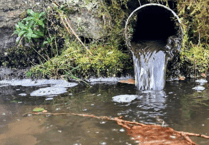SOME KIND of madness has invaded the corridors of Hywel Dda health board’s corporate offices in Carmarthen.
Ever since the board’s plan to basically destroy Bronglais Hospital’s top-notch stroke unit came to light months ago, it’s been clear we’re being asked to endorse something that’s fundamentally crackers.
A 12-week public consultation exercise on this and other aspects of Hywel Dda patient services, launched at the end of May, presents a powerful opportunity to demand this insanity is ditched. Don't miss it.
At the very least, Hywel Dda’s hopelessly ill-thought-out treat-and-transfer model holds out the prospect of ill and traumatised patients no longer receiving the bulk of their stroke treatment close to home, but very many miles away. That really isn't acceptable.
At worst, the strategy quite obviously puts people’s lives at risk. That’s inherently the case if you bundle a fragile someone who’s just been given clot-busting treatment into the back of an ambulance and despatch them along bumpy roads to a hospital 65 miles distant. As one community doctor scathingly put it to me: “This is a plan worked out on the back of an envelope.”
An initially restive public has become straightforwardly angry. But what is now clear is that implications of this dangerously hare-brained scheme seem not to have occurred to the health strategists behind it.
Under Hywel Dda proposals, Bronglais Hospital would continue to provide clot-busting thrombolysis required within a so-called golden one-hour time-window after a stroke strikes.
After that, the plan goes, patients would be transferred to Prince Philip Hospital, Llanelli, or Withybush Hospital, Haverfordwest, either of which is at least two hours away by road.
Medical professionals are aghast. One told me: “I would ask: ‘Where are all these spare ambulances able to transport a patient down to Llanelli at short notice?
“Further, if a patient is thrombolysed they need very close monitoring for the first 24 hours by a stroke specialist nurse, because they can deteriorate very quickly.
“Would paramedics be happy to take on this extra responsibility?”
Neither the potential perils for patients of being driven long distances without a stroke specialist nurse, nor the expectations loaded on to paramedics, get a mention in pre-consultation statements by the health board, or in answers to detailed recent questioning by this column.
With Glangwili Hospital, Carmnarthen’s stroke unit also threatened with demotion to treat-and-transfer status, I asked the board how it could seriously consider halving from four to two the number of stroke units in the vast Hywel Dda region, which includes a Bronglais catchment of north Ceredigion, west and mid Powys and south Gwynedd.
It would leave middle and northern parts of the area completely without a fully-fledged stroke unit. Meanwhile, Sentinel Stroke National Audit Programme - a major Wales, England and Northern Ireland healthcare quality improvement programme - awards Bronglais a rating that is the best among all four of the existing stroke units.
The board, under its chief executive, Philip Kloer, shies away from serious consideration of the looming scandal of leaving umpteen thousands of people in Ceredigion, Powys and Gwynedd totally without access to a proper stroke service. This is a deficiency that, in some countries of mainland Europe, would be regarded with astonishment, if not horror.
The board says the “medical workforce” for stroke is more fragile at Bronglais and Glangwili because, despite attempts to recruit permanent specialists they currently rely on single-handed locum consultants. For months past, however, job vacancies advertised by the board have made not a single mention of stroke specialists.
All available evidence, however, shows that the Bronglais stroke unit as operating currently works excellently, which inevitably gives rise to suspicion that the turmoil being lined up for the hospital rests on a zealous enthusiasm by one or more board managers for centralisation of services as a desktop exercise which pays little or no attention to humanitarian practicalities.
Other arguments against meddling with Aberystwyth’s efficient, patient-orientated stroke service demand consideration.
For one thing, it’s recognised that confirming a diagnosis of stroke can be a difficult clinical decision, and Bronglais is known to admit a significant number of patients, particularly out of hours, who are subsequently shown to have not had a stroke. The question arises of whether all these patients would be trundled down to Llanelli, and then brought back. The board is silent on that too.
Another medical professional - like the others speaking only under assurance of anonymity - points out that stroke care, after the first critical 24 to 72 hours, revolves mainly around rehabilitation and recovery rather than highly skilled medical interventions. Entirely unnecessary to be bundled 70 miles to Llanelli for that.
Without doubt, recovery from a stroke calls for emotional and psychological strength, a large part of which will need to be provided by patients’ close relatives and friends.
You’ll look in vain, however, for health board travel advice for a wife or husband from such as Corris or Ceinws, without a car, or unable to afford the petrol, who badly needs to give moral support and practical help to a spouse who has had a stroke and happens to be in Llanelli, 85 miles away.
Not the kind of problem within the daily ambit of a health board planner with a comfy motor in the office car-park. But it should be.



.jpeg?width=209&height=140&crop=209:145,smart&quality=75)

Comments
This article has no comments yet. Be the first to leave a comment.